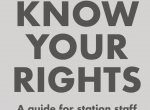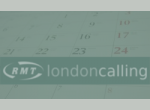What is working life like for women (and men) on the Bucharest Metro? How does it compare to our situation on London Underground? In Bucharest with the ETF Women's Committee, I spoke with Metro workers and gathered some facts …
The Metro is publicly-owned, run by ‘Metrorex’ under the direction of the national government’s Ministry of Transportation. Some ten years ago, however, the maintenance was privatised, and is now in the hands of Alstom - a company with its fingers in many urban transport pies, including London's Tube, where it supplied and maintains Northern line trains under one of the original PFI contracts.
The Bucharest Metro receives a high and increasing public subsidy, as a deliberate policy to promote public transport in the interests of easing pollution, congestion and parking. These problems are evident at street level, with cars parked on pavements and roads - it must be a difficult city to navigate in a wheelchair (and is quite tricky on a crutch). Fares are relatively cheap: a two-trip ticket cost me 5 Lei (90p); travel for a whole month would have cost around £14. This stands in stark contrast to London’s far-higher fares and declared government intention to remove public subsidy from the Tube’s ‘operational budget.
If (like me), you are intrigued by the technical details of the Bucharest Metro, have a look at its website or its Wikipedia page. In summary, it has four lines and 51 stations, and will continue to expand from the 69.25 km (43 miles) that it currently covers, with new lines, extensions and stations in the building or planning stages. Passengers make half a million journeys on a typical Bucharest weekday, while five times that many trips are made on the other part of the city's public transport system, the RATB (light rail, trolleybuses, trams).
Lifts and escalators from street to platform levels make some stations fairly accessible, but this is not universal.
Around 4,500 people work on the Metro, nearly 2,000 of them women, and 99% of them are members of the union. Yes, in contrast to London, there is just one trade union for Metro workers, and it is only for Metro workers: the Unitatea Sindicatul Liber din Metrou (USLM: the United Free Trade Union of the Metro). It unites with other transport workers (and water, sewage and other service workers) as part of the Romanian federation ATU.
All the stations have ticket offices and station staff, and all the trains - both the old, Romanian-built stock and the newer trains built by Bombardier - have both drivers and assistants (guards).
While women work in all grades, they are the majority only among ticket office and station staff - on my brief visit, I saw only two men and many more women working on stations and in ticket offices! Metro workers’ average wage of 300 euro per month is less than the Romanian average, and although women and men are of course paid the same rates for the same jobs, the fact that drivers are paid more than station and ticket staff means that women are paid on average less than men. This is almost certainly true on London Underground as well.
The union is fighting to improve working conditions. USLM is particularly concerned about the health impact of poor air quality in the workplace, where pollution is 10% higher than in the general atmosphere. While it is pushing the employer into installing modern and effective air conditioning, it demanded - and won - the right of every Metro worker to take four days additional leave to spend recuperating in the clean air of Romania's mountains.
- Janine's blog
- 6689 reads






